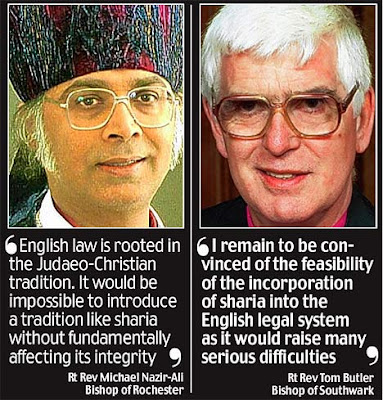
Leading bishops publicly contradicted Dr Rowan Williams's call for Islamic law to be brought into the British legal system.
With the Church of England plunged into crisis, senior figures were said to be discussing the archbishop's future.
One member of the church's "Cabinet", the Archbishop's Council, was reported as saying: "There have been a lot of calls for him to resign. I don't suppose he will take any notice, but, yes, he should resign."
Officials at Lambeth Palace told the BBC Dr Williams was in a "state of shock" and "completely overwhelmed" by the scale of the row.
It was said that he could not believe the fury of the reaction. The most damaging attack came from the Pakistan-born Bishop of Rochester, the Right Reverend Michael Nazir-Ali.
He said it would be "simply impossible" to bring sharia law into British law "without fundamentally affecting its integrity".
Sharia "would be in tension with the English legal tradition on questions like monogamy, provisions for divorce, the rights of women, custody of children, laws of inheritance and of evidence.
"This is not to mention the relation of freedom of belief and of expression to provisions for blasphemy and apostasy."

The church's second most senior leader, Archbishop of York Dr John Sentamu, refused to discuss the matter. But he has said sharia law "would never happen" in Britain.
Politicians joined the chorus of condemnation, with Downing Street saying British law should be based on British values. Tory and LibDem leaders also voiced strong criticism.
Even prominent Muslims were rounding on Dr Williams. Shahid Malik, Labour MP for Dewsbury, said: "I haven't experienced any clamour or fervent desire for sharia law in this country.
"If there are people who prefer sharia law there are always countries where they could go and live."
Khalid Mahmood, Labour MP for Birmingham Perry Bar, rejected the idea that British law forces Muslims to choose between their religion and their society.
He said: "This will alienate people from other communities because they will think it is what Muslims want - and it is not."
The Muslim Council of Britain came to Dr Williams's aid, however, describing his comments in a lecture to lawyers and a BBC interview as "thoughtful".
But Oxford University Islamic scholar Professor Tariq Ramadan admitted: "These kinds of statements just feed the fears of fellow citizens. I really think we, as Muslims, need to come up with something that we abide by the common law and within these latitudes there are possibilities for us to be faithful to Islamic principles."
The archbishop is likely to come under heavy fire next week at a meeting of the Church's General Synod.
Liberal and feminist critics have been appalled by the thought of sharia law while evangelical opponents believe Dr Williams has failed to defend Christianity.
The archbishop was already battling intractable difficulties within the church over gay rights, a row which began nearly five years ago and has brought him criticism from all sides. Later this year he has to face a conference of hundreds of bishops from around the world which threatens further bitter division.
Dr Williams's opponents on the conservative evangelical wing - who resent his liberal beliefs on issues such as gay rights - were suggesting last night that the archbishop is finished.
The Reverend Paul Dawson of the Reform group of around 500 clergy said: "We are very sad that he does not seem to be able to articulate a clear Christian vision for Britain. It is true to say that there is a lot of dissatisfaction."
Dr Williams defended himself in a Lambeth Palace statement saying he had been trying to "tease out" the issue.
The archbishop had said it could help build a better and more cohesive society if Muslims were able to choose to have marital disputes or financial matters, for example, dealt with in a sharia court. The adoption of some elements of sharia law "seems unavoidable".
But the statement insisted: "The archbishop made no proposals for sharia, and certainly did not call for its introduction as some kind of parallel jurisdiction to the civil law."
Even fellow bishops, however, think this is precisely what Dr Williams did say.
Bishop of Southwark Tom Butler, a liberal who would normally be expected to defend Dr Williams, said the archbishop had been entering a minefield and added: "It will take a great deal of thought and work before I think it is a good idea."
He was more blunt in a circular to clergy in his diocese, saying he had yet to be convinced of the feasibility of incorporating any non-Christian religious law into the English legal system.
0 comments:
Post a Comment